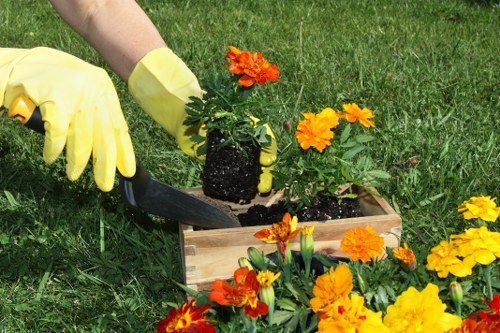Lawn Mowing in Notting Hill: Your Comprehensive Guide

Maintaining a lush, green lawn in Notting Hill can be a rewarding yet challenging task. Whether you’re a long-time resident or a new homeowner, understanding the nuances of lawn care in this vibrant London neighborhood is essential for achieving a beautiful outdoor space.
Notting Hill, known for its picturesque streets and iconic market, offers a unique environment for gardening enthusiasts. The area's climate, soil type, and local vegetation all play a role in how your lawn will thrive.
In this guide, we’ll explore the best practices for lawn mowing in Notting Hill, provide tips on selecting the right services, and highlight the benefits of maintaining a well-kept lawn in this bustling area.
Why Lawn Mowing is Important in Notting Hill

Lawn mowing is more than just a routine chore; it’s a critical aspect of lawn maintenance that promotes healthy grass growth. In Notting Hill, where homes often feature expansive gardens, regular mowing ensures that your lawn remains an attractive and inviting space.
Proper lawn mowing techniques can prevent pests, reduce weed growth, and enhance the overall appearance of your property. Additionally, a well-maintained lawn can increase the value of your home, making it a worthwhile investment for homeowners.
Understanding the specific needs of your grass type and local weather conditions is key to effective lawn mowing. In Notting Hill, the temperate climate supports a variety of grass species, each requiring different care routines.
Choosing the Right Grass for Notting Hill

Selecting the appropriate grass type for your Notting Hill lawn is crucial for minimizing maintenance efforts and ensuring a lush appearance. Warm-season grasses like Bermuda and Zoysia thrive in the region's climate, offering durability and resilience.
Cool-season grasses such as Ryegrass and Fescue are also popular choices, providing vibrant color and texture. Consulting with a local lawn care professional can help you determine the best grass variety for your specific needs and soil conditions.
Additionally, incorporating a mix of grass types can enhance the overall health and appearance of your lawn, making it more resistant to diseases and environmental stressors.
Best Practices for Lawn Mowing

Adhering to best practices for lawn mowing is essential for maintaining a healthy and vibrant lawn in Notting Hill. Here are some key guidelines to follow:
- Regular Mowing: Mow your lawn consistently, typically once a week during the growing season, to promote even growth.
- Proper Height: Maintain the recommended grass height, usually between 2.5 to 3.5 inches, to encourage root development and shade out weeds.
- Sharp Blades: Ensure your mower blades are sharp to make clean cuts, reducing the risk of disease and promoting healthy growth.
- Grass Clippings: Leave grass clippings on the lawn to provide natural nutrients, or collect them if they become too thick.
- Mowing Pattern: Vary your mowing direction each week to prevent soil compaction and promote upright grass blades.
Implementing these practices can significantly enhance the health and appearance of your lawn, making it a standout feature in the Notting Hill neighborhood.
Tools and Equipment for Effective Lawn Mowing

Investing in the right tools and equipment is crucial for efficient and effective lawn mowing in Notting Hill. Here are some essential tools to consider:
- Mower: Choose between a traditional push mower, a string trimmer, or a robotic mower based on the size and complexity of your lawn.
- Edger: An edger helps create clean lines along pathways and garden beds, enhancing the overall appearance of your lawn.
- Mulching Blades: These blades finely chop grass clippings, allowing them to decompose quickly and return nutrients to the soil.
- Safety Gear: Protective gloves, eyewear, and sturdy footwear are essential for safe mowing practices.
- Maintenance Tools: Regularly clean and maintain your mowing equipment to ensure optimal performance and longevity.
Having the right equipment not only makes lawn mowing more manageable but also contributes to the health and beauty of your lawn in Notting Hill.
Hiring Professional Lawn Mowing Services in Notting Hill

While DIY lawn mowing is an option, hiring professional services in Notting Hill can offer numerous benefits. Professional lawn care providers bring expertise, specialized equipment, and a commitment to maintaining the highest standards for your outdoor space.
Here are some advantages of opting for professional lawn mowing services:
- Expert Knowledge: Professionals understand the local climate, soil conditions, and grass types, allowing them to tailor their services to your lawn’s specific needs.
- Time-Saving: Delegating lawn care tasks frees up your time, enabling you to focus on other important aspects of home maintenance.
- Consistent Results: Regular professional maintenance ensures your lawn remains healthy and aesthetically pleasing throughout the year.
- Comprehensive Services: Many lawn care providers offer additional services such as fertilization, weed control, and pest management, ensuring a holistic approach to lawn health.
- Equipment Maintenance: Professionals maintain their equipment, ensuring efficient and effective lawn mowing without the hassle of upkeep on your part.
Choosing a reputable lawn mowing service in Notting Hill can significantly enhance the quality and appearance of your lawn, providing peace of mind and a beautiful outdoor space.
How to Choose the Right Lawn Mowing Service

Selecting the right lawn mowing service in Notting Hill requires careful consideration of several factors. Here are some tips to help you make an informed decision:
- Reputation: Research local lawn care companies, read reviews, and ask for recommendations to find a trusted provider.
- Experience: Choose a service with extensive experience in lawn care, particularly in the Notting Hill area, to ensure they understand the specific needs of your lawn.
- Services Offered: Ensure the company offers the services you need, whether it’s regular mowing, trimming, edging, or seasonal maintenance.
- Pricing: Compare pricing structures and ensure there are no hidden fees. Look for transparent and competitive rates.
- Insurance: Verify that the company is insured to protect your property and avoid potential liabilities.
By considering these factors, you can select a lawn mowing service that meets your needs and ensures your Notting Hill lawn remains in top condition.
Seasonal Lawn Care Tips for Notting Hill

Different seasons require different lawn care approaches to maintain a healthy and resilient lawn in Notting Hill. Here are some seasonal tips to keep your lawn in prime condition throughout the year:
Spring
- Clean Up: Remove any debris, dead grass, and leaves to prepare your lawn for the growing season.
- Aerate the Soil: Aeration helps improve soil permeability and promotes healthy root growth.
- Fertilize: Apply a balanced fertilizer to provide essential nutrients for your grass.
Summer
- Watering: Ensure consistent and adequate watering, especially during dry spells, to keep your grass hydrated.
- Mow Regularly: Maintain the recommended grass height to prevent stress and promote resilience against heat.
- Weed Control: Address any weed issues promptly to prevent them from taking hold.
Autumn
- Raking: Remove fallen leaves to prevent mold growth and encourage healthy grass preparation for winter.
- Overseeding: Add new grass seeds to fill in bare spots and enhance lawn density.
- Fertilize: Apply a high-phosphorus fertilizer to support root growth before winter.
Winter
- Minimize Traffic: Avoid walking on the lawn to prevent soil compaction and protect grass from damage.
- Equipment Care: Store your lawn equipment properly to prevent damage and ensure it’s ready for spring.
- Plan for Spring: Assess your lawn’s condition and plan any necessary treatments or improvements for the upcoming season.
Adapting your lawn care routine to each season ensures your Notting Hill lawn remains healthy, vibrant, and resilient throughout the year.
Dealing with Common Lawn Issues

Even with regular maintenance, lawns in Notting Hill can encounter various issues. Addressing these problems promptly can prevent long-term damage and maintain your lawn’s health. Here are some common lawn issues and how to handle them:
- Pests: Insects like grubs and lawn beetles can damage grass roots. Use eco-friendly pesticides or natural remedies to control infestations.
- Disease: Fungal diseases such as powdery mildew or rust can affect grass health. Apply appropriate fungicides and ensure proper lawn ventilation to reduce humidity.
- Weeds: Common weeds like dandelions and crabgrass compete with your grass for nutrients. Regular mowing, proper fertilization, and targeted herbicides can help manage weed growth.
- Drought Stress: Extended dry periods can stress your lawn. Implement efficient watering systems and consider drought-resistant grass varieties.
- Soil Compaction: Heavy foot traffic or poor soil structure can compact the soil, hindering root growth. Aerate your lawn regularly to improve soil permeability.
Proactively addressing these issues ensures your Notting Hill lawn remains robust and aesthetically pleasing.
The Environmental Benefits of a Well-Maintained Lawn

Maintaining a healthy lawn in Notting Hill offers numerous environmental benefits. A well-kept lawn contributes to the local ecosystem and enhances the overall quality of the neighborhood. Here are some key environmental advantages:
- Air Quality: Grass absorbs carbon dioxide and releases oxygen, improving air quality and providing a natural filter for pollutants.
- Temperature Regulation: Lawns help cool the surrounding area through the process of evapotranspiration, reducing the urban heat island effect.
- Soil Health: Healthy grass roots help prevent soil erosion, maintain soil structure, and promote nutrient cycling.
- Biodiversity: A vibrant lawn supports various insects, birds, and other wildlife, enhancing local biodiversity.
- Water Management: Properly maintained lawns can absorb and retain rainwater, reducing runoff and mitigating flood risks.
By investing in lawn care, you’re not only enhancing the beauty of your property but also contributing to a healthier and more sustainable environment in Notting Hill.
Eco-Friendly Lawn Mowing Practices

Adopting eco-friendly lawn mowing practices in Notting Hill can minimize your environmental impact while maintaining a beautiful lawn. Here are some sustainable approaches:
- Electric or Manual Mowers: Use electric or manual mowers instead of gas-powered ones to reduce emissions and noise pollution.
- Mulching: Leave grass clippings on the lawn to decompose naturally, returning nutrients to the soil and reducing the need for chemical fertilizers.
- Efficient Watering: Water your lawn during the early morning or late evening to minimize evaporation and ensure optimal hydration.
- Organic Fertilizers: Opt for organic fertilizers and natural pest control methods to promote a healthy, chemical-free lawn.
- Composting: Compost grass clippings and garden waste to create nutrient-rich soil amendments for your lawn.
Implementing these practices supports environmental sustainability and fosters a healthier ecosystem in Notting Hill.
Closest Areas to Notting Hill for Lawn Mowing Services
- Kensington: Located just west of Notting Hill, Kensington offers expansive gardens and parks, making lawn mowing services highly sought after.
- Paddington: North of Notting Hill, Paddington features a mix of residential and commercial properties requiring regular lawn maintenance.
- Ealing: Further west, Ealing's suburban landscape benefits from professional lawn care to maintain its green spaces.
- Holland Park: Adjacent to Notting Hill, Holland Park is known for its scenic gardens, necessitating expert lawn mowing services.
- Maida Vale: To the northeast, Maida Vale's elegant terraces and communal gardens often require specialized lawn care.
- Westbourne Park: Just south of Notting Hill, Westbourne Park's residential areas benefit from reliable lawn mowing services.
- Maida Hill: Close to Notting Hill, Maida Hill features beautiful lawns and green spaces that need regular maintenance.
- Shepherd's Bush: Southwest of Notting Hill, Shepherd's Bush has a mix of properties that rely on professional lawn care.
- Bayswater: Northeast of Notting Hill, Bayswater is known for its gardens and lush lawns, making lawn mowing services essential.
- Maida Vale: Further north, Maida Vale offers picturesque lawns that benefit from expert maintenance.
- Royal Borough of Kensington and Chelsea: Surrounding Notting Hill, this area includes some of London's most prestigious gardens requiring top-tier lawn mowing services.
These nearby areas complement Notting Hill's vibrant community, each offering unique features and requirements for lawn maintenance. Whether you reside in the bustling streets of Paddington or the serene gardens of Holland Park, accessing quality lawn mowing services is convenient and essential for maintaining your outdoor spaces.
FAQs about Lawn Mowing in Notting Hill
1. How often should I mow my lawn in Notting Hill?
Generally, during the growing season (spring and summer), mowing once a week is recommended. Adjust the frequency based on grass growth and weather conditions.
2. What is the best time of day to mow the lawn?
The ideal times are early morning or late afternoon when the temperature is cooler, and the grass is dry, reducing stress on the lawn.
3. Should I bag my grass clippings or let them decompose?
It’s best to mulch the clippings and leave them on the lawn. This provides natural nutrients and reduces the need for additional fertilizers. However, if clippings are too thick, you may need to collect them.
4. What type of mower is best for a Notting Hill lawn?
The best mower depends on your lawn size and personal preference. Electric mowers are eco-friendly, while gas mowers offer more power for larger areas. Manual or robotic mowers are also excellent for smaller, well-maintained lawns.
5. How can I prevent weeds from growing in my lawn?
Regular mowing, proper fertilization, and consistent watering help prevent weed growth. Additionally, using pre-emergent herbicides and maintaining a dense grass cover can reduce weed issues.